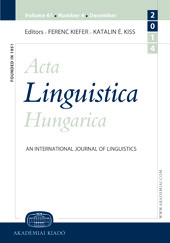Lexeme derivation and multi-word predicates in Hungarian
Lexeme derivation and multi-word predicates in Hungarian
Author(s): Farrell AckermanSubject(s): Morphology, Lexis
Published by: Akadémiai Kiadó
Keywords: morphology; phrasal predicate; periphrasis; morphological exponence; representational modularity;
Summary/Abstract: This paper focuses on predicate formation operations which affect the value and determination of lexical properties associated with Hungarian phrasal periphrastic predicates and, hence, on lexeme-formation (Aronoff 1994). Recent work, following the word and paradigm morphological models of Robins (1959), Matthews (1972), among others, has argued that periphrasis or multi-word expression is often best viewed as a type of morphological exponence, i.e., as the product of morphological rather than syntactic operations, contra many current theoretical proposals. In line with this morphological perspective, I argue that, as in inflection, periphrasis is a type of morphological exponence for lexeme-formation. In support of this claim I explore lexeme-formation for several sorts of phrasal predicates in Hungarian Ackerman (1987), Komlósy (1992), Kiefer-Ladányi (2000), among others), in particular causative formation, causal predicate formation, so-called reiterated activity formation expressed by reduplicated preverbs, and the interaction of these operations with category changing derivation. The general background for the analysis will be the Realization-based Lexicalist Hypothesis (Blevins 2001) and realizational approaches to morphology (Stump 2001) which are compatible with theories subscribing to representational modularity (Jackendoff (1997; 2002).
Journal: Acta Linguistica Hungarica (Since 2017 Acta Linguistica Academica)
- Issue Year: 50/2003
- Issue No: 1-2
- Page Range: 7-32
- Page Count: 26
- Language: English

